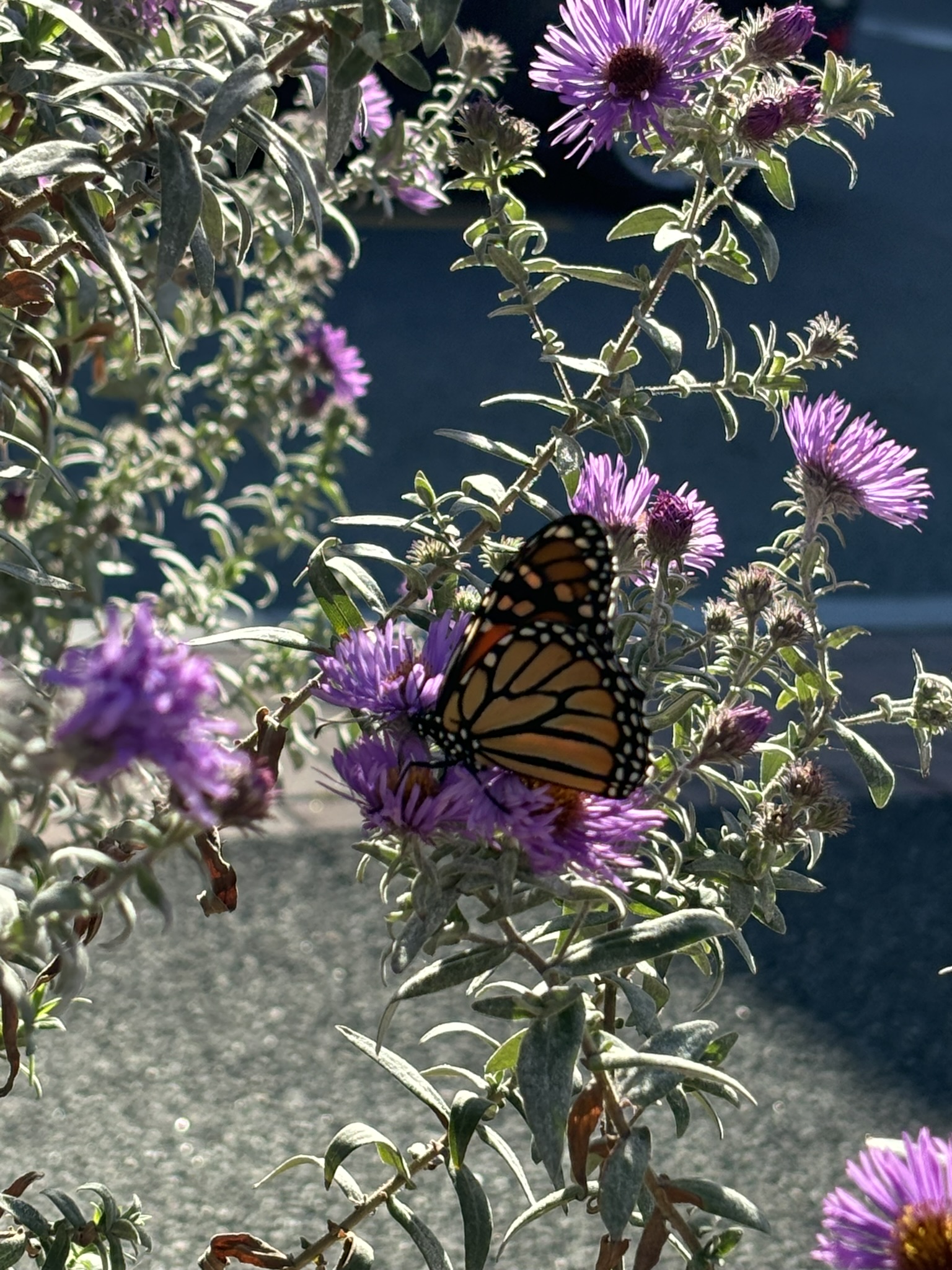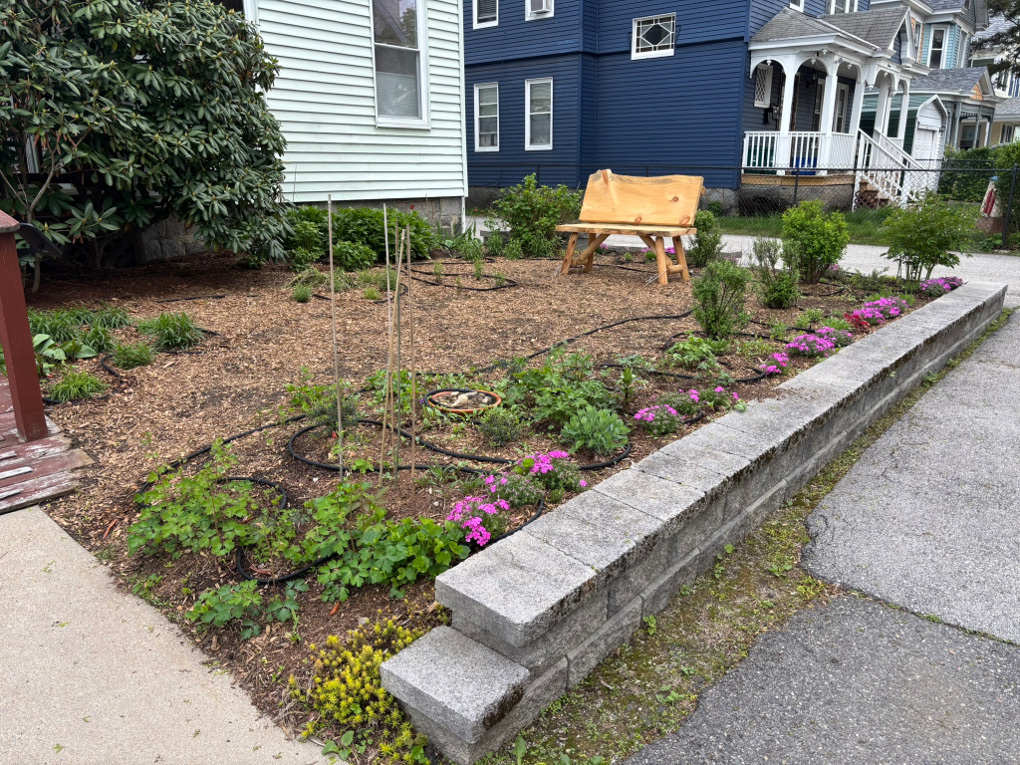MassLandlords Continues Biodiversity Efforts with Launch of New Conservancy
| . Posted in News - 0 Comments
By Eric Weld, MassLandlords, Inc.
A couple of years ago, we had a unique idea at MassLandlords. We sought to coordinate a public project to help restore biodiversity and add much-needed green space to urban environments in Massachusetts. We launched a new nonprofit conservancy, applied for a state grant and reached out to key partners to further our biodiversity aspirations. It’s all part of our commitment to creating conditions for better rental housing and better business, in “better communities,” as our tagline says.

A migratory monarch took rest and food from native asters planted in the heart of Somerville’s Union Square on Oct 6, 2024. Monarchs are important pollinators, but you don’t see as many as you used to. Monarchs and other butterflies have declined in population by about 80% in recent decades, due to climate change, loss of habitat and insecticide usage. Restoring habitats for Monarchs and other pollinators is foremost among MUC objectives. CC BY-NC Bumblerbe iNaturalist. https://www.inaturalist.org/observations/246015089
We recognized that cities and towns in our state are sorely lacking in trees, vegetation and general biodiversity, and continuing to lose the natural wild growth that they have. We sought to reverse that trend.
We set to work devising ways, means and infrastructure for carrying out our mission of building and restoring biodiversity in urban centers across Massachusetts. We see this as a pro-business initiative that will reduce long-term rental housing operational costs while increasing property values.
We began by seeking funding for our environmental projects and forming working partnerships with nonprofits and professionals working in intersecting areas. And we created MUC.
Massachusetts Urban Conservancy (MUC)
With Board of Directors approval, we incorporated a new conservancy at the beginning of 2025, the Massachusetts Urban Conservancy (MUC). We applied for and received 501(c)(3) tax-exempt status from the Internal Revenue Service and built a website outlining our aspirations and projects in early progress. For now, MUC is staffed and funded by MassLandlords, but the intent is that it should be externally staffed and funded, and to fly on its own in close partnership with local real estate operators.
Foremost in the MUC mission is forestalling and offsetting impacts of climate change. We aim to create and grow more native trees and plants in urban areas across the state, and to retain wild areas that we have. Copious research shows the importance of trees and greenery to residents of Environmental Justice communities.
These communities too often are exposed to less healthy air and higher levels of pollutants in comparison with other urban neighborhoods. EJ communities also typically have higher population density, fewer trees and natural vegetation, higher exposure to pollutants, more concrete and less exposure to sunlight. As a result, residents register higher rates of asthma, respiratory diseases and some cancers. Planting trees and creating green spaces leads to surprising outcomes, including better health, lower cost of living, better academic performance, lower crime and increased investments, studies show.
Importantly, our mission also includes working with students and science teachers in developing curricula around the living biodiversity labs that we create. We also plan to coordinate volunteer teams consisting of young people and residents of neighborhoods where we are conducting biodiversity projects. We think it’s essential to demonstrate to young people and urban residents the health, aesthetic and social benefits of creating and nurturing greenery, as well as pollinator and animal habitats, near their homes. At the same time, we aim to provide thriving examples of biodiversity restoration, to engage their commitment to healthy environment and advocacy for robust biodiversity.

One of MUC’s first projects, this Worcester rental front lawn is shown mid-construction, with grass removed and temporarily mulched over while awaiting plant deliveries. This owner elected to purchase a bench as a human focal point and to give purpose to the yard as it temporarily loses vegetation. Native phlox was already in bloom after just 30 days. More plants are planned for placement through June 2025. Cc by-sa-4-massachusetts-urban-conservancy
MassLandlords Community Outreach
Before creating MUC, one of our first actions was to reach out to you, our members, and others in the state, seeking donations of unbuildable land for the purpose of creating fast-growing mini-forests in urban areas, preferably Environmental Justice neighborhoods. We suspect there are hundreds of such lots in our state’s cities and towns – leftover corner parcels after a building development, too small to build on; or lots on slopes or in partial wetlands, conditions that render them unbuildable. Owners of these lots pay property taxes year after year with no return on that investment, money out the window.
We saw this as a symbiotic opportunity: Land donors could clear the unusable land from their annual tax burden while we transform the empty lot into a thriving green space, inviting pollinators and small animals, that would provide generations of benefit to residents there.
We were fortunate to receive verbal commitments for two land donations, one in Randolph and one in Springfield. Both parcels are small lots, each under one acre, ideal for our mini-forest plans. These donations are still in progress and have not closed.
We reached out and partnered with the Cambridge nonprofit Biodiversity for a Livable Climate, Bio4Climate for short, an organization that has created mini-forests in Cambridge and other communities. Bio4Climate creates forests using the Miyawaki method. It’s a forest-growing procedure invented and developed by the late Akira Miyawaki, a Japanese horticulturist, that creates conditions in an intended area for fast forest growth, with site and soil optimization, and native plants and trees densely planted. There are now more than 200 Miyawaki forests around the world.
We are in the process of transferring ownership of these land parcels to MUC.
State Grant Speed Bump
To finance our land transformation projects, we applied for an Urban and Community Forests Challenge Grant from the state Department of Conservation and Recreation. The DCR annually awards funds (earmarked in the federal Inflation Reduction Act) for proposals to add trees and greenery to Massachusetts cities.
We learned in May 2025 that we were not awarded the DCR grant for this year. It was a minor setback for our urban forest projects, but we plan to move forward and possibly apply for the grant again in fall 2025, armed with a couple of years of experience.
In the process of applying for the grant, we reached out and established working relationships with a range of professionals to enlist support: science teachers in Springfield, tree wardens and conservation experts in both cities, in addition to Bio4Climate. Our idea for MUC and the endeavor to build urban biodiversity generated enthusiasm from all perspectives. Despite the denial of grant funding, we intend to build and add to the partnerships we forged, and to keep growing a statewide community of like-minded people interested in restoring and creating biodiversity through a series of projects.
We are seeking more partners. If you are interested in working with us or learning more about what we are doing, drop us a note via email: info@muc.bio.
MUC Moving Ahead
As we seek other sources for funding, we are continuing our development of several other biodiversity projects. Most immediately, we are in the process of transforming the grass front yard of a rental property in Worcester into a low-maintenance, self-sustaining, flowering garden of native plants and ground cover.
The benefits of this yard garden project are many. It will pay for itself in only a few years with savings from never again having to mow, fertilize, weed or prune the space. That in itself saves hundreds of dollars every year. The garden will also provide habitats for pollinators like butterflies, bees and birds. It will help the environment by reducing carbon emissions from gas-powered mowers, trimmers and leaf blowers. And, importantly, it will add a rainbow of color, greenery, aroma and eventually shade for owners and tenants of the property.
We plan to use this low-maintenance yard garden as a model for others who would like to never mow again, while providing pollinator habitats, adding biodiversity and enjoying a beautiful space right outside their windows.
If you are interested in working with us to create your own no mow yard garden, email info@muc.bio.
Join the MUC Team
As we build MUC, we need as many partners as we can get. We envision a big network of volunteers, consultants and advisors across Massachusetts, helping us create and maintain dozens (hundreds!) of small biodiversity projects on rental properties, donated empty lots, even rooftops.
Whoever you are and whatever you do, there are ways you can help us. We need your ideas, your advice, assistance and energy.
As we like to say: join us in the muck at MUC.
Email us at info@muc.bio.
Learn how the new Massachusetts Urban Conservancy is reducing property owner expenses and giving back to the community.




